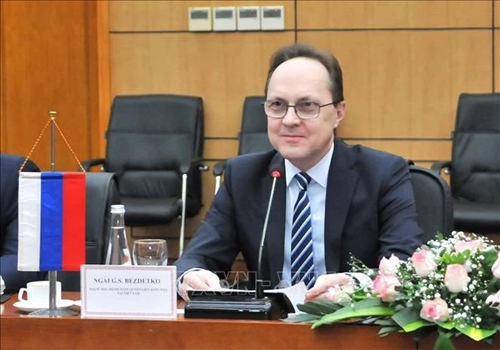Speaking to the press on June 19, Bezdetko noted that President Putin will lead a delegation of leaders of the Russian Federation, regions, and major businesses during the June 19-20 visit. He will have talks and meetings with Vietnamese leaders and alumni of the former Soviet Union and Russian universities. The two sides are expected to issue a joint statement and sign cooperation agreements in higher education, justice, customs, healthcare, energy, and science.
    |
 |
|
Russian Ambassador to Vietnam G.S. Bezdetko |
Bezdetko stressed that the visit coincides with the 30th anniversary of the Treaty on Principles of Friendly Relations between Vietnam and Russia (June 16, 1994 - 2024).
This historic treaty has helped significantly expand bilateral interactions and laid a foundation for developing and implementing large joint projects and initiatives in various areas. It heralded a new period of multifaceted cooperation between the two countries and provided a prerequisite for strengthening the ties and elevating the Russia - Vietnam relations to a comprehensive strategic partnership, according to the ambassador.
The two countries will soon celebrate other milestones, including the 30th anniversary of Hoa Binh hydroelectric power plant, the largest hydropower complex in Vietnam constructed with assistance from the Soviet Union and completed with help from Russia, in December 2024; the 75th anniversary of diplomatic ties in January 2025; and the 10th anniversary of the Free Trade Agreement between Vietnam and the Eurasian Economic Union (EAEU), of which Russia is a member, in May 2025.
Building on the strong foundation from previous high-level exchanges, he affirmed that President Putin's visit aims to boost cooperation in multiple fields, including economy, investment, science - technology, education - training, culture, tourism, humanitarian exchanges, and national defense - security.
Bezdetko stated that Russia is ready to work closely with Vietnam on the international stage, especially at the United Nations and within the frameworks centering on the Association of Southeast Asian Nations (ASEAN), to address urgent issues of the era and uphold the fundamental principles of sovereignty equality, non-interference in the internal affairs of independent nations, and legitimacy and justice in international relations, he said.
The diplomat mentioned Russia's support for multi-platform cooperation among associations like the EAEU, Shanghai Cooperation Organization, and ASEAN, aiming to bolster economic connectivity and foster an expanded Asia-Europe Partnership. He also highlighted BRICS as a promising platform for interaction with Vietnam.
Acknowledging the vast potential for the bilateral collaboration, he underlined Russia's wish for closer and effective cooperation in the fields of energy, industrial production, science - technology, education - training, national defense - security, trade, and investment, as well as for consistent implementation of the agreements at high and highest levels.
According to the ambassador, key tasks include ensuring peace and security in the broadest sense; combating terrorism, transnational crimes, and drug trafficking; and fighting existing and emerging challenges and threats.
Russia is ready to provide Vietnam with the most cutting-edge, trustworthy, and stable technologies in the field of clean energy, firstly nuclear power, Bezdetko remarked.
In education, Russia has established a union of technical universities to expand the training of experts in high technology, information technology, energy, and aircraft production. It has offered the largest quota of free education to Vietnam, with 1,000 scholarships.
Cultural and educational events have been held regularly to celebrate the shared history and values of both countries, the ambassador said, adding that people-to-people diplomacy remains one of the most important tools for the two countries' interactions.
In conclusion, the diplomat affirmed that Vietnam and Russia share a rich history and extensive cooperation in most areas, underpinned by political dialogue, humanitarian exchanges, and similar development orientations, providing a solid foundation for their comprehensive strategic partnership.
Source: VNA